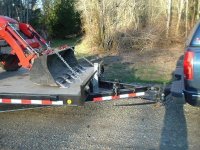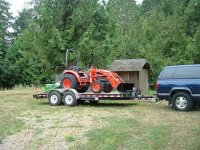Just wondering if anyone has experience with both air springs and weight distributing hitches. If so which do you think gives better towing and why. I am going to put one or the other on a 1/2 ton truck to pull a 7000lb trailer. It work quite well without either except for the fact that the rear leaf springs bottom out.
I know that a heavier truck is the better solution but that is not in the cards right now. /forums/images/graemlins/frown.gif So lets just not talk about that.
Thanks for any help.
I know that a heavier truck is the better solution but that is not in the cards right now. /forums/images/graemlins/frown.gif So lets just not talk about that.
Thanks for any help.


